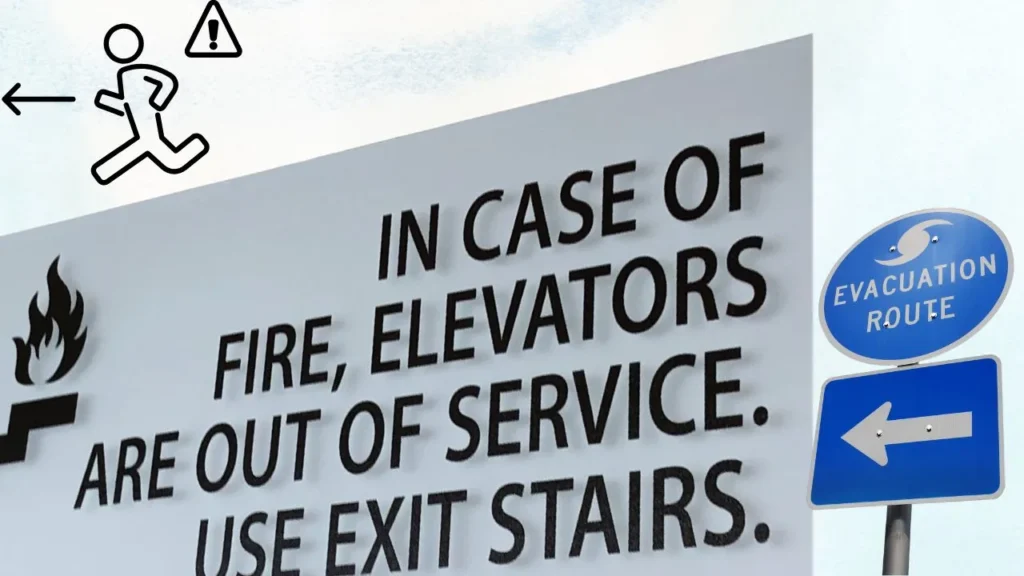Fire Evacuation Orders.When a wildfire, chemical spill, or natural disaster threatens a community, the authorities sometimes issue a mandatory evacuation order. This means everyone in the affected area is expected to leave immediately for their own safety. But here is the big question that many people wonder: “Can I legally stay behind in my home, even if there’s an evacuation order?”
In some cases, refusing to leave can be against the law. This blog breaks it down in simple language so everyone knows what evacuation orders mean, what happens if you do not leave, and how the law views those who stay behind.
Fire Evacuation Orders: Can You Legally Stay Behind? – Overview
| Article on | Fire Evacuation Orders: Can You Legally Stay Behind? |
| Voluntary Evacuation | Leaving is advised but not enforced as you stay at your own risk. |
| Mandatory Evacuation | You are legally expected to leave by ignoring it may bring penalties. |
| Staying Behind | No rescue services will come, and utilities may be cut off. |
| Re-Entering Early | Going back before clearance can be treated as trespassing or looting. |
| Reason for Orders | To save lives, reduce chaos, and protect first respondents. |
Why Fire Evacuation Orders Exist
Fire and emergency officials do not issue evacuation orders lightly. They know leaving your home is stressful, and people worry about their property. But evacuation orders are designed for one reason i.e. to save lives.
- The wildfires can change direction in seconds. Smoke, flying embers, and toxic air can be deadly even if flames don’t reach your house.
- House fires, explosions, or chemical spills can create invisible dangers such as toxic gases.
- Emergency responders cannot risk their lives to rescue the people who refused to evacuate.
Can You Legally Stay Behind?

- In Most Cases, You Won’t Be Dragged Out
- In the U.S. and Canada, police do not usually go door-to-door physically forcing people out.
- Adults often can refuse to leave but that does not mean it is legal or smart.
- Legal Consequences Are Real
- Some states and provinces allow fines or even arrest if you refuse a mandatory evacuation.
- If you go back into a closed evacuation zone before it’s lifted, you could be treated as a trespasser or looter, even if it is your own home.
- By staying, you may also lose insurance coverage if your property is damaged, since you ignored official safety instructions.
- Emergency Services Will Not Help You
- If you call 911 during a wildfire and you refuse to evacuate, responders may not come. As disaster experts say: “You’re on your own.”
- Utilities such as electricity, water, and gas are often shut off in evacuated zones, leaving you without basic survival needs.
Risks of Staying Behind
Even if the law does not physically remove you, the risks are serious:
- Loss of Rescue Services: Firefighters and paramedics won’t risk themselves to save people who ignored orders.
- Health Hazards: Smoke inhalation, mudflow, or toxic chemicals can kill long before flames reach the house.
- Isolation: Roads may be blocked, communication lines cut, and fuel unavailable.
- Legal Problems: Possible fines, arrest, or being labeled as a trespasser.
Why Some People Choose to Stay
Even with the risks, many people resist evacuation orders. Common reasons behind this are as follows:
- Fear of looting or theft if they leave their property.
- Strong attachment to their home and belongings.
- Distrust of government or belief that the danger is exaggerated.
- Wanting to protect livestock, pets, or family businesses.
What To Do If an Evacuation Order Comes
Instead of debating whether to stay, the best plan is to prepare ahead. That way, leaving is quicker, safer, and less stressful.
1. Pack a “Go Bag”
- IDs, passports, and important documents.
- Medications, glasses, and personal hygiene items.
- Flashlight, radio, chargers, and backup batteries.
- At least 3 days of food and water.
- Extra clothes, masks, and pet supplies.
2. Secure Your Property
- Walk around and lock the windows, doors, and sheds.
- Turn off utilities if advised.
- Photograph each room for insurance.
- Back up the computer files to a USB drive or cloud.
3. Plan for Your Family
- Decide a meeting point in case you’re separated.
- Share an out-of-town contact person for updates.
- Assign responsibilities (e.g., who grabs pets, who gets the go bag).
4. Leave Early, Not Late
Do not wait until the fire is at your doorstep. Traffic jams, smoke, and blocked roads can trap you if you delay.
Real-Life Stories & Legal Opinions
- Some retired firefighters say prosecution is rare, but evacuation orders are only given when life is in extreme danger.
- Legal experts point out that refusing to leave can indeed bring charges if it endangers first responders or if you re-enter restricted zones.
- Disaster specialists emphasize that refusing to evacuate means “no one is coming for you.”
Final Thoughts
If you ever face a required evacuation, remember this: Your safety is worth more than your house or belongings. Lock up, grab your go bag, and get out when told. The law might give you a choice, but nature won’t.
| Home Page | https://sbbarristers.com/ |
FAQs for Fire Evacuation Orders
Ques.1. Will the police force me out of my house?
Usually not. Adults are rarely dragged out, but you’ll be left completely on your own.
Ques.2. Can I be arrested for refusing to evacuate?
Yes, in some places. If you ignore a required order, you may face fines or arrest, especially if you re-enter restricted zones.
Ques.3. Can I go back before the order is lifted?
No, re-entering early may get you treated as a trespasser or looter.
Ques.4. What is the reason behind the issue of these orders by the authorities?
To save lives, protect first responders, and reduce disorder during dangerous situations.
